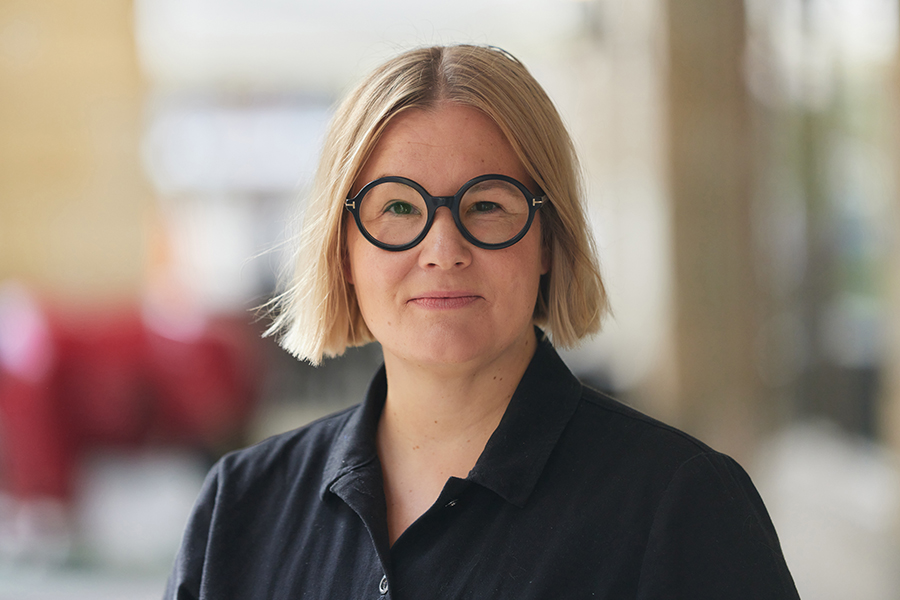
“For me, curatorial work has always stood for societal action”
Mirjami Schuppert has worked as the Programme Lead at the Finnland-Institut for just under a year now. Her great interest in international collaborations, art and research brought her into the world of the Institut. Irina Ruusuvuori interviewed Mirjami.
“I attach great importance to creating and maintaining dialogue between different cultures. An international job where I can use my previous knowledge, networks and experience here in Germany felt like a natural next step for me,” says Schuppert.
Schuppert has worked as a curator both independently and in various institutions in Finland, Germany and Northern Ireland. Her curatorial projects in galleries, museums and public spaces have included everything from exhibitions and events to seminars and publications. She holds a bachelor’s and master’s degree in cultural history from the University of Turku and a PhD in curating from the University of Ulster in Belfast, Northern Ireland.
“For several years, I have followed the activities of cultural institutes around the world, and I consider their role in creating and maintaining dialogue between different cultures to be important,” Schuppert says.
Previously, Schuppert worked as the executive director of the Titanik Gallery in Turku, which is run by the artists’ association Arte. Her work in the artist-run gallery shaped her into a confident player in the art world, with extensive knowledge in the field of contemporary art. Her work is based on attentive and diverse dialogue, where diversity and the artist’s own voice come first.
“Through Titanik’s activities, I gained a broad overview of the Finnish contemporary art scene, and through that I have been able to build a dense network of contacts. My time at the Titanik made me more aware of the possibilities of curating and implementing projects and events that are down to earth and easily accessible to everyone. I also became familiar with sound art, thanks to the gallery’s high-quality sound art residency,” Schuppert states.
Schuppert is responsible for both the cultural and science programmes at the Finnland-Institut. Her curatorial dissertation studies have served as a tool to highlight the connection between art and science. Schuppert has also taught internationally at various universities and higher education institutions.
“We should question our understanding of what knowledge is. Making art is producing knowledge, and art is also research. I want to promote dialogue between art and science and emphasise the connection between them,” Schuppert says.
Schuppert always works from a reflective, critical and feminist perspective, through which she seeks to make the invisible visible. She places great emphasis on creating a programme that doesn’t sweep inclusivity and social issues under the rug. At the Titanik Gallery, Schuppert worked actively to highlight POC artists and make their art visible in the Finnish art world. Similarly, the Wi Di Mimba Wi Art Prize, which she founded in 2021 together with SAVVY Contemporary in Berlin, aims to create exhibition opportunities for POC artists.
“I want to be involved in creating a diverse, high-quality programme for the Institut, but at the same time be willing to take risks and work with lesser-known artists and artists in the early stages of their careers,” says Schuppert.
According to Schuppert, an ideal programme should be approachable, address social issues, and challenge the status quo. She believes that cooperation with large commercial operators is still fruitful, but now is the time to emphasise long-term cooperation with smaller partners, with whom there must be an active discussion about what is relevant in each operating environment.
“It is extremely important to be aware of the discourse currently taking place in the cultural and academic sectors in German-speaking Europe and to participate in it as a critical, supportive and compassionate companion. The work of an institute must always be socially meaningful and interesting to a wide audience. It can be anything from artists’ studio visits to a feminist craft club. In the future, I would like to see more site-specific art, where the environment and its history are part of the work,” Schuppert says.
By site-specific art, Schuppert refers to art that is created in a specific place and has a critical relationship with its environment.
“Fifty years ago, the significance of a site-specific work was seen to arise in relation to its physical environment, but since then more attention has been paid to the different dimensions of space, such as social space and its layered nature. A work implemented in a public space can be negatively perceived as invading a certain place and the lived space of the community living there. What makes site-specific projects challenging and fascinating is that there are so many things that cannot be controlled. It is necessary to consider the different contexts of the area, such as its history, politics and the fact that the work is always in the midst of the community, part of the living environment of different communities. At the same time, the potential of site-specific art lies in the fact that it is never detached from its environment, and each viewer or listener experiences the work differently from their own context,” Schuppert says.
According to Schuppert, collaboration with lesser-known actors and site-specific art could be great opportunities to make the Institut’s repertoire more diverse and multidimensional. She will emphasise that the work of the Finnland-Institut is always confrontational and innovative, and that both scientific and cultural programmes present different aspects of Finland and create critical dialogue between Finland and German-speaking Europe.
“For me, curatorial work has always stood for societal action,” Schuppert concludes.
Mirjami Schuppert lives in Potsdam with her family and enjoys the peace and quiet outside Berlin. However, she loves Berlin because of its endless possibilities, both professionally and culturally.
Translated by Viivi Tigerstedt

